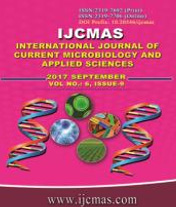


 National Academy of Agricultural Sciences (NAAS)
National Academy of Agricultural Sciences (NAAS)

|
PRINT ISSN : 2319-7692
Online ISSN : 2319-7706 Issues : 12 per year Publisher : Excellent Publishers Email : editorijcmas@gmail.com / submit@ijcmas.com Editor-in-chief: Dr.M.Prakash Index Copernicus ICV 2018: 95.39 NAAS RATING 2020: 5.38 |
Orchids are the most fascinatingly beautiful flowers and unique group of plants of nature. With their exotic shapes, hues and the added advantage of longevity, these flowers of rare beauty have become increasingly popular in the 21st century. They belong to the Orchidaceae family and consisting 600-800 genera and 25,000-35,000 species. Today growing orchid is more than just a hobby, it is an international business covering around 10% of the world floriculture trade. Especially, some of the exquisitely rare hybrids of orchid are among the top ten cut flowers. It has become possible by adopting in vitro tissue culture techniques for their rapid multiplication. Since, orchids are strictly out breeders, seed propagation results in unwanted heterozygous types. So, vegetative propagation techniques require accurate regeneration protocol for obtaining in vitro cultured true to type plants. In fact, the technical aspect of micropropagated orchids have improvised significantly in past few years. But the loop holes in micropropagation stems from the somaclonal variation, phenolic compound exudation explants, hardening and so on. We endeavour to include the major contribution based on orchid tissue culture starting from the pioneering work of Rotor, G. 1949 to Balilashaki et al., 2014.
 |
 |
 |
 |
 |